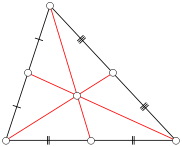15
3
Consider a triangle ABC where each side has integer length (an integral triangle). Define a median of ABC to be a line segment from a vertex to the midpoint of the opposing side. In the figure below, the red line segments represent the medians. Note that any given triangle has three medians.

Let n be some positive integer. How many non-degenerate integral triangles with each side length less than or equal to n have at least one integral median?
Challenge
Write a program to compute the number of integral triangles with at least one integral median for a given maximum side length n. The order of the side lengths does not matter, i.e. <6,6,5> represents the same triangle as <5,6,6> and should be counted only once. Exclude degenerate triangles such as <1,2,3>.
Scoring
The largest n for which your program can generate the number of triangles in 60 seconds on my machine is your score. The program with the highest score wins. My machine is a Sony Vaio SVF14A16CLB, Intel Core i5, 8GB RAM.
Examples
Let T(N) be the program with input N.
T(1) = 0
T(6) = 1
T(20) = 27
T(22) = 34
Note that T(1) = T(2) = T(3) = T(4) = T(5) = 0 because no combination of integral sides will yield an integral median. However, once we get to 6, we can see that one of the medians of the triangle <5,5,6> is 4, so T(6) = 1.
Note also that T(22) is the first value at which double-counting becomes an issue: the triangle <16,18,22> has medians 13 and 17 (and 2sqrt(85)).
Computing the medians
The medians of a triangle can be calculated by the following formulas:



Current top score: Sp3000 - 7000 points - C
Comments are not for extended discussion; this conversation has been moved to chat.
– Doorknob – 2015-07-15T20:22:40.480